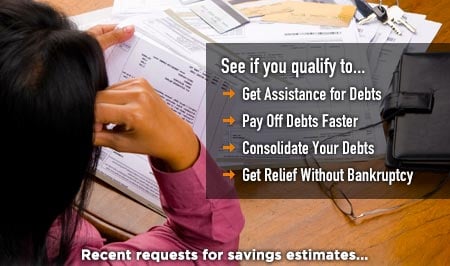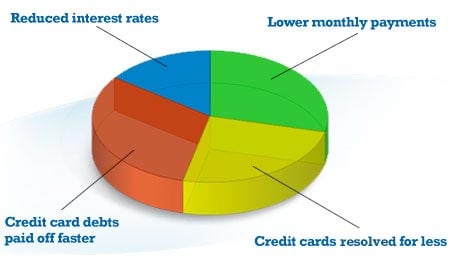
Grant Alternatives and Debt Relief
Many individuals and families in North Carolina as well as in other parts of the country need relief from their high-interest credit card debts and other types of unsecured debts. If you are like one of them, there are several debt relief options - including debt consolidation, debt settlement, or even bankruptcy - that may help you get you on the way towards reducing your debts and potentially saving you money.
However, many consumers struggling with credit card debt also look for government-funded grants or government debt relief grants. Yet, while the federal government has typically provided debt relief bailouts for banks and other types of financial institutions, the government does not offer any financial aid or grants that can be used to pay off consumer debts, particularly credit card bills and unsecured debts such as department store charges, gas cards, medical expenses, and other unsecured personal debts.
See your debt relief options. Answer a few, simple questions and request a free debt relief analysis and savings estimate.
Debt Relief Options
If you are overwhelmed with credit card debts, there is help available. One way that has been proven to help reduce debts is debt consolidation through a credit counseling agency, or what you may see referred to as a debt management plan (DMP). When you enroll in a debt consolidation program, credit counselors will assess your finances, debt amount, and income.
Afterwards, they will typically create a strategy to help reduce your debts and submit proposals (on your behalf) to creditors asking for a reduction in interest rates, and the elimination of any late fees and other penalties. The goal of debt consolidation is to provide you with a single, more manageable, and more structured payment plan - one that will let you, hopefully, direct more of your money towards paying the principal of your debts versus simply just paying the interest.
The Debt Settlement Alternative
Another viable debt relief option is debt settlement. This is a process where you hope to settle or negotiate with your creditors for substantially less than what you actually owe. In many cases, consumers in a debt settlement program are advised to stop paying their credit card bills and accumulate funds over a period of time that they can use to make a reasonable settlement offer.
In cases like this, creditors may threaten to take legal action against consumers that default on the terms of their credit card agreements - and likely result in a decline in one's credit scores. Yet, in spite of the potential risks, debt settlement remains a popular alternative to bankruptcy - which can have a devastating and longer lasting impact on personal credit.
Compare your debt relief options today. Get a free debt relief analysis and savings estimate - begin here.
The Credit Card Act of 2009
Even though the government does not directly offer any debt relief grants or bailouts to consumers struggling with credit card debts, it has made significant changes to credit card legislation to protect and maintain your consumer rights.
Signed into law by President Barack Obama, the Credit Card Act of 2009 requires creditors to provide 45 days notice if they are planning to increase interest rates. The Credit Card Act of 2009 also requires credit card companies to allow you to cancel the credit card in question and pay the card's balance at the older rate - not at the new, increased rate.
In addition, the Credit Card Act of 2009 bans credit card companies from retroactively increasing rates on a cardholder's balance in good standing for reasons (such as applying for new credit or buying a new car) that are unrelated to the card holder's payment history with that particular card.
Government-Funded Resources
While the government does not generally provide debt relief alternatives in the form of grants, it does offer a variety of programs that can assist consumers who are overburdened with debts. If you are in such a debt predicament and your bills, for instance, have piled up and your income has been reduced, and you are facing the possibility of foregoing essentials - such as medicine, food, and utilities- there is good news. Help is available.
In North Carolina, a program called TANF - Work First - Temporary Assistance For Needy Families is an example of how the government typically offers assistance. Programs such as Work First reach out to financially-strapped residents and provide assistance in the areas of food and nutrition, child care, energy assistance, and job training, among others.
So no matter what method you choose to get credit card debt relief - whether it's in the form of debt consolidation or debt settlement - or perhaps you simply want to take advantage of a government-funded program to assist with your needs - there is help available for you.
See your debt relief options today. Request a FREE debt relief analysis and savings estimate in minutes.























